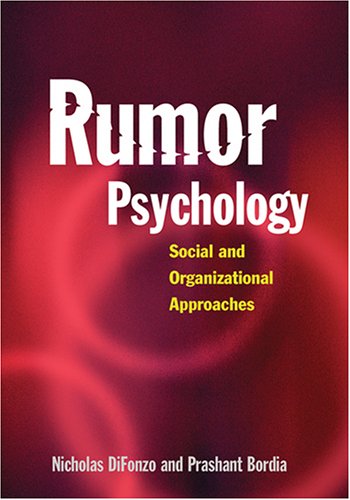(Ebook) Rumor Psychology: Social And Organizational Approaches by Nicholas Difonzo, Prashant Bordia ISBN 9781591474265, 1591474264
From Hurricane Katrina to the Iraqi War, national and international media accounts have abounded with rumors about the U.S. government blowing up levees in New Orleans and American soldiers using night-vision goggles to spy on Iraqi women in Fallujah. However, these reports turned out to be false. In Rumor Psychology: Social and Organizational Approaches, expert rumor researchers Nicholas DiFonzo and Prashant Bordia investigate how rumors start and spread, the accuracy of different types of rumor, and how rumors can be controlled, particularly given their propagation across media outlets and within organizations. Exactly what is rumor, and how does it differ from gossip? Even though these terms are commonly used interchangeably, they differ greatly in function and content. While gossip is evaluative social talk that provides social network formation and group solidarity, rumor functions to make sense of an ambiguous situation or to help people adapt to perceived or actual threats. Why do people spread and believe rumors? Rumors are an enduring feature of our social and organizational landscapes. They attract attention, evoke emotion, incite involvement, affect attitudes and actions-and they are ubiquitous. Rumor transmission is motivated by three broad psychological motivations-fact-finding, relationship-enhancement, and self-enhancement-all of which help individuals and groups make sense in the face of uncertainty. Rumor is closely entwined with a host of social and organizational phenomena, including social cognition, attitude formation and maintenance, prejudice and stereotyping, group dynamics, interpersonal and intergroup relations, social influence, and organizational trust and communication. Organizational rumors, in contrast with natural disaster rumors, tend to be highly accurate, with accuracy being affected by cognitive, motivational, situational, group, and network factors. DiFonzo and Bordia describe how managers can
*Free conversion of into popular formats such as PDF, DOCX, DOC, AZW, EPUB, and MOBI after payment.


